By default, WordPress displays your blog posts on the home page. However, if you are making a business website or simply want to customize your homepage, then you may want a separate page for your blog section.
This setup not only helps you keep your homepage clean and focused but also provides a dedicated space for readers to explore your blog content.
To improve the user experience and maintain a clear focus on our offerings, we have added separate blog pages on many of the websites of our partner companies, including WPForms, OptinMonster, and All in One SEO. This allows visitors to easily access blog content while prioritizing the primary goal of promoting our plugins.
In this article, we will show you two ways to create a separate page for blog posts in WordPress.
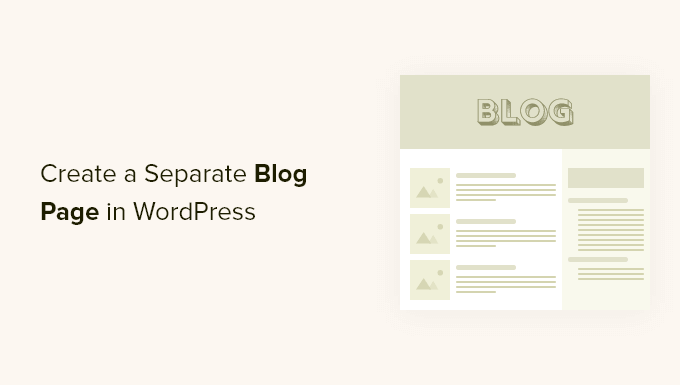
Why Display Blog Posts on a Separate Page?
The home page is the front page of your WordPress website and the first page your visitors see. By default, WordPress shows your most recent posts on your home page, and that makes sense if you are running a blog.
But it’s not always ideal for small business websites. You will probably want a more engaging home page that tells users about your business, products, and services, lets them know how to contact you, and boosts your sales conversion.
Now, if you also want to run a blog on your website, then you will need to provide another page where visitors can go to read your posts.
Having said that, we will show you how to easily create a separate page for blog posts in WordPress.
In this tutorial, we have discussed two methods, and you can use the links below to jump to the method of your choice. Keep in mind that the second method is the simplest and offers the most customization:
Video Tutorial
If you’d prefer written instructions, then just keep reading.
Method 1: Creating Separate Pages for Blog Posts in WordPress
You can create a separate page for blog posts using default WordPress settings.
However, this method takes a little more work than Method 2 and does not offer as many customization options.
Creating a Separate Home Page and Blog Page
First, you must create two separate WordPress pages to use as your home page and blog page.
You don’t need to add any content to those pages, and you can name them anything you like. For instance, some business websites use ‘News’ for their blog page.
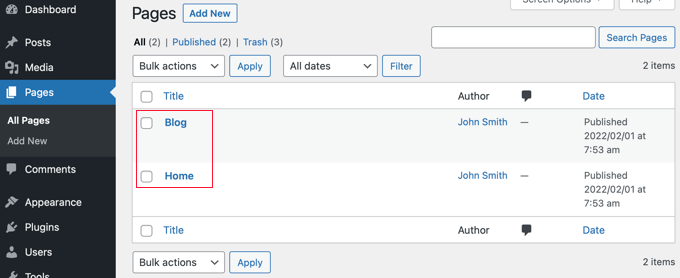
Once you have created those pages, visit the Settings » Reading page in the WordPress admin area.
Now, under the section labeled ‘Your homepage displays’, you need to click on the button for ‘A static page’.
After that, you can select the Home and Blog pages you created earlier. You should then scroll down and click the ‘Save Changes’ button.

Now, when you navigate to the Pages » All Pages screen from the WordPress dashboard, you will see that the Home page is labeled ‘Front Page’ and the Blog page is labeled ‘Posts Page’.
Go ahead and click on the ‘View’ link under the Blog page to preview it.
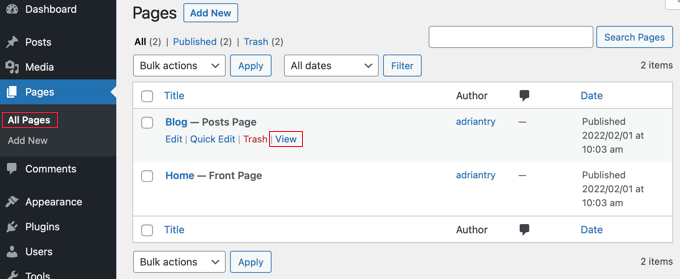
The appearance of these pages depends on your WordPress theme, and you may wish to configure these settings.
For example, if your theme has a navigation menu, then you will notice that WordPress has automatically added the new Blog and Home pages. If not, then refer to our beginner’s guide on how to add a navigation menu in WordPress.
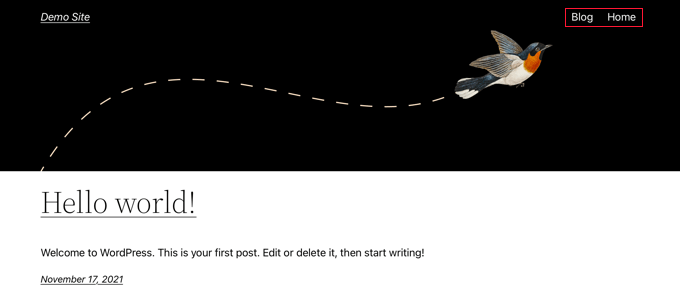
Customizing Your Home Page
So far, your new home page is blank. Now it’s time to add information about your business, products, and services and let your visitors know how they can contact you.
You can learn how to do that in our guide on how to create a custom home page in WordPress. In Method 1, we show you how to use the block editor to add cover images, columns, tables, text and media, galleries, and more.
You’ll also find lots of creative customization ideas in our guide on how to edit a WordPress home page easily and effectively.
Customizing Your Blog Page
If you’re happy with the way your blog page looks, then your job is finished.
However, if you are currently using a block-based theme, then you can also customize your blog page by visiting the Appearance » Editor screen from the WordPress dashboard.
Once you are there, select the ‘Pages’ option from the left column in the full site editor.
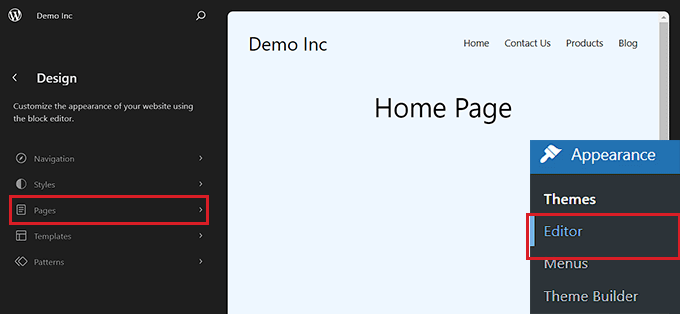
This will open a list of all the pages on your website in the left column.
From here, select the ‘Blog’ page option and then click on the page preview on the right to start customizing your blog page.
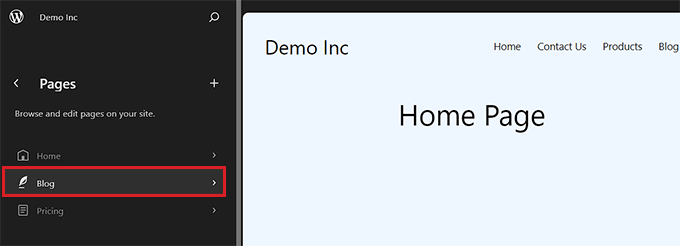
You can now click on the add block ‘+’ button in the top left corner of the screen and add blocks of your choice to the page.
Additionally, you can change the background, text, or link color on your blog page by clicking on the ‘Styles’ icon at the top right corner of the screen.
This will open a block panel on the right from where you can click the ‘Typography’ tab to change text color, the ‘Colors’ tab to change background color, and the ‘Layout’ tab to configure your blog page’s dimensions.
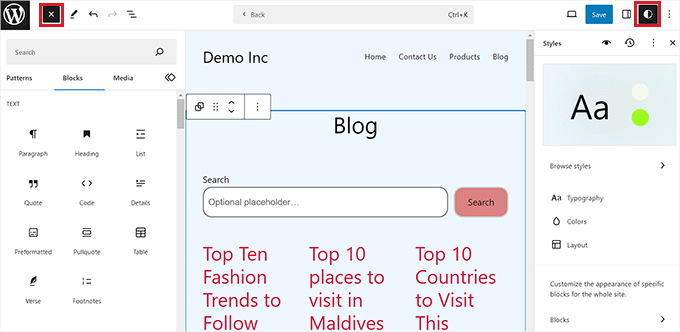
Once you are done, don’t forget to click the ‘Save’ button at the top to store your settings.
Now, you can visit your WordPress blog page to see how it looks.
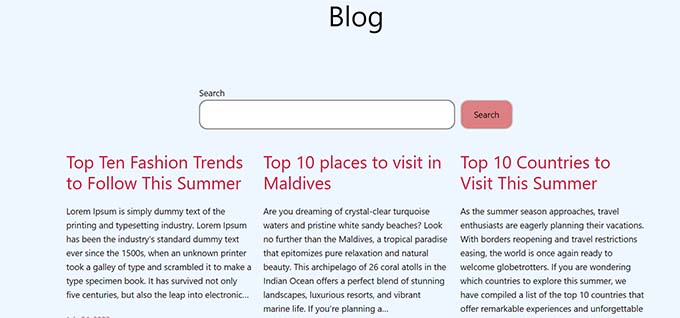
However, if you are using a classic theme, then you will need to use Method 2 instead to customize your blog post page.
Method 2: Creating a Customized Page for Blog Posts With a Drag & Drop Builder (Recommended)
A theme builder plugin allows you to easily create a custom WordPress theme without any code. That includes the ability to create and customize a separate page for blog posts.
Installing the SeedProd Theme Builder
First, you need to install and activate the SeedProd plugin. For more details, see our step-by-step guide on how to install a WordPress plugin.
SeedProd is the best drag-and-drop WordPress page builder for businesses, bloggers, and website owners. It also has a theme designer that allows you to easily customize your blog page and much more.
You can read our complete SeedProd review for more details.
Upon activation, visit the SeedProd » Settings page to enter your license key. You can find this information in your account on the SeedProd website.
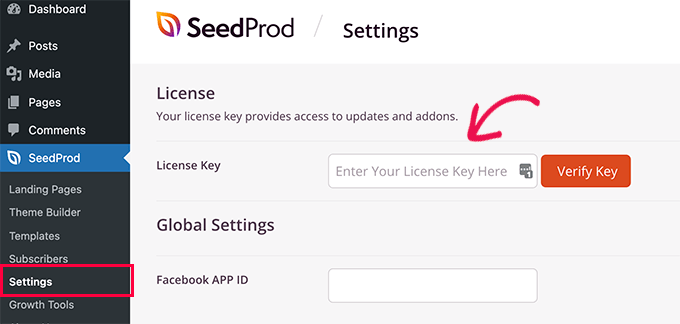
After that, it’s time to create a custom WordPress theme. This is much simpler than it sounds.
Creating a Custom WordPress Theme
First, you need to visit the SeedProd » Theme Builder page. Here, you’ll use one of SeedProd’s ready-made themes as a starting point. This will replace your existing WordPress theme with a new, custom design.
You can do that by clicking the ‘Themes’ button.
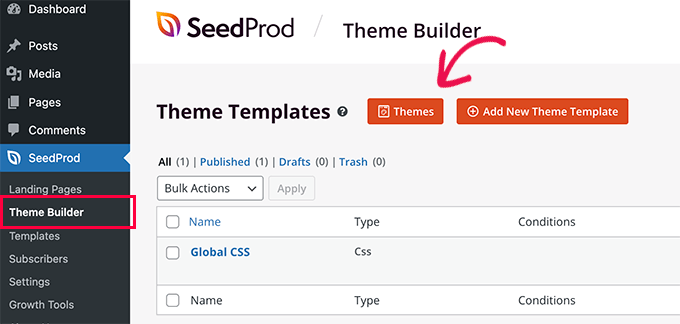
You will now be shown a list of professionally designed themes that are designed for different types of websites.
For example, there are templates called ‘Modern Business’, ‘Marketing Agency’, and ‘Mortgage Broker Theme’.
Have a look through the options and select one that best matches your needs by clicking the checkmark icon.
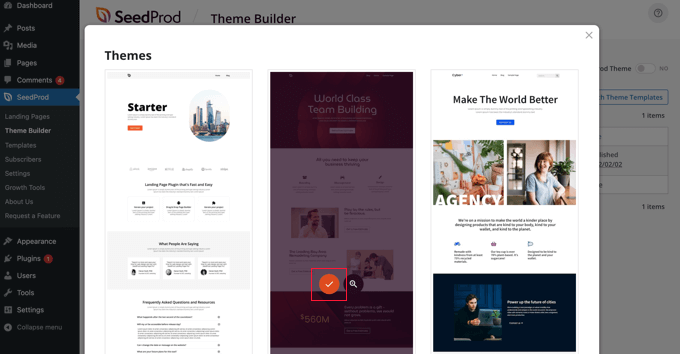
Once you have chosen a theme, SeedProd will generate all the theme templates, including one for your blog index and one for your home page.
These are not just empty pages but come set up with attractive layouts and placeholder content that’s easy to customize.
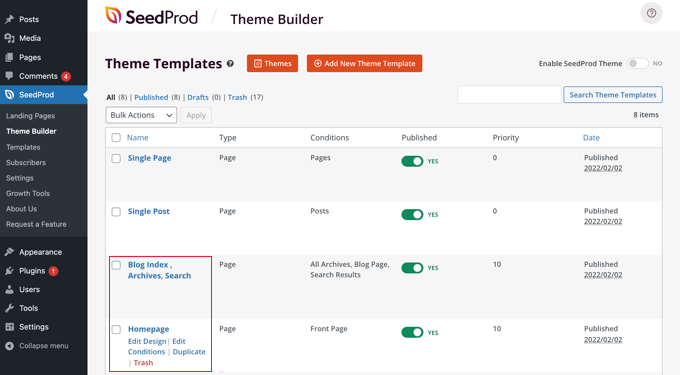
In this tutorial, we will show you how to customize the home page and blog index templates.
You might also like to customize the other templates. To learn how to do that, see our beginner’s guide on how to easily create a custom WordPress theme.
Customizing Your Home Page
Once you have generated your theme templates, you can edit them using the SeedProd theme builder. We will start with the Homepage template.
Simply click the ‘Edit Design’ link under the homepage to get started.

This will launch the template file in the SeedProd theme builder.
This simple drag-and-drop builder will show a live preview of your page to the right and a block toolbar on the left.
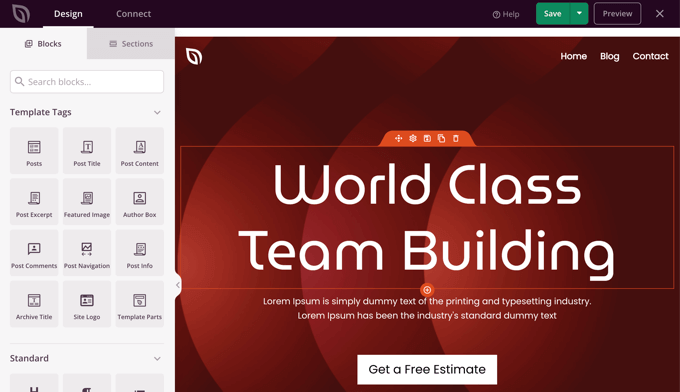
You can customize any block by clicking on it, dragging blocks up and down with your mouse, and adding new blocks to the page.
We’ve written a complete guide on how to create a custom home page in WordPress. Simply scroll down to Method 2 to learn how to customize your home page using SeedProd.
Customizing Your Blog Page
The SeedProd theme builder also provides plenty of ways to customize your blog index page.
Get started by clicking the ‘Edit Design’ link under the page.

You will see the same preview pane on the right and the toolbar on the left. You can customize the blog page the same way you did with the home page.
For example, when you click on the headline, you will be able to see all of its settings. You can edit the text, change the alignment and font size, and more.
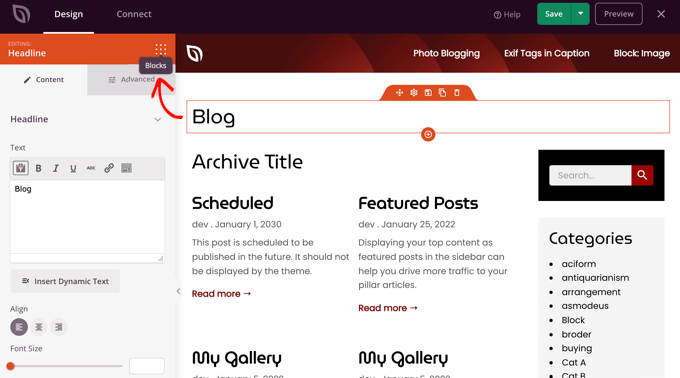
Once you’ve finished, you’ll need to click on the ‘Blocks’ icon to return to the toolbar.
The SeedProd theme builder offers additional Template Parts blocks, such as a Posts block, which displays a list of your blog posts.
The Posts block has already been added to the blog index template for you, and in this template, the block displays your posts in two columns. We can change this to a single column.
Simply click on the Posts block and then change the ‘Columns’ setting to 1.
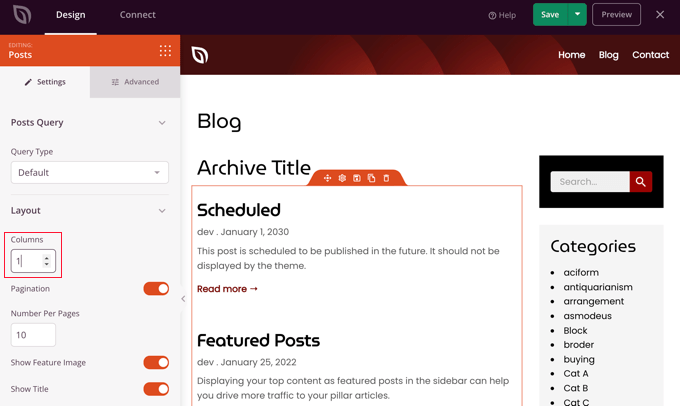
The layout will immediately change to a single column.
As you scroll down the Posts block settings, you’ll find toggle switches that let you choose whether or not to display the post’s feature image and title. You can also choose which header tag to use for the post title.
There are also options for displaying different post metadata. You can toggle the date modified, author, date and time published, and the comment count.
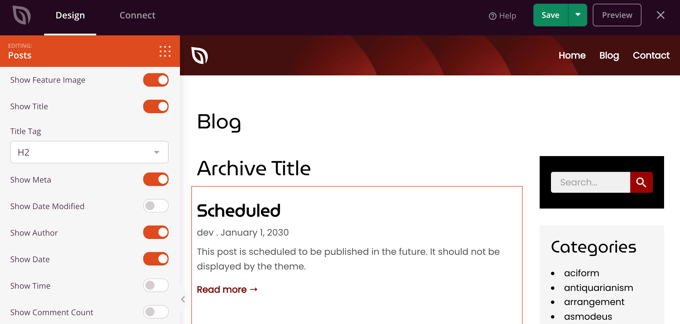
Here are a few more ways that you can customize your blog index:
- You can filter the index by post type, category, tag, or author.
- The sort order of the posts can be changed.
- You can choose how many posts are displayed on a page.
- You can toggle the post excerpt and customize its length.
Once you have finished customizing your blog page, make sure you click the ‘Save’ button at the top of the screen. Then, you can return to the list of templates by clicking the ‘X’ icon.
Enabling the SeedProd Theme
Once you have finished customizing the theme templates, you will need to publish the new custom theme.
Simply toggle the ‘Enable SeedProd Theme’ setting to the ‘YES’ position.
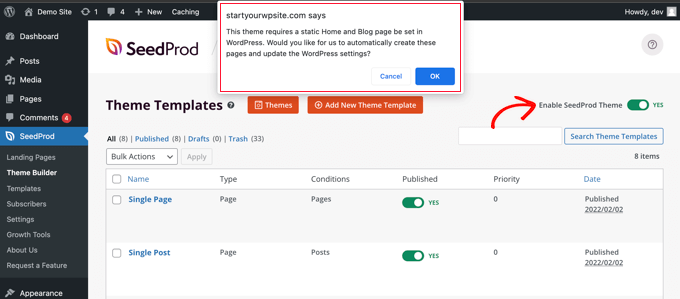
You will immediately see a notification that the WordPress Home and Blog page settings need to be changed. When you click the ‘OK’ button, these settings will be changed for you.
You can now visit your website to view your new home page and blog page. This is how the blog index page looks on our demo site.
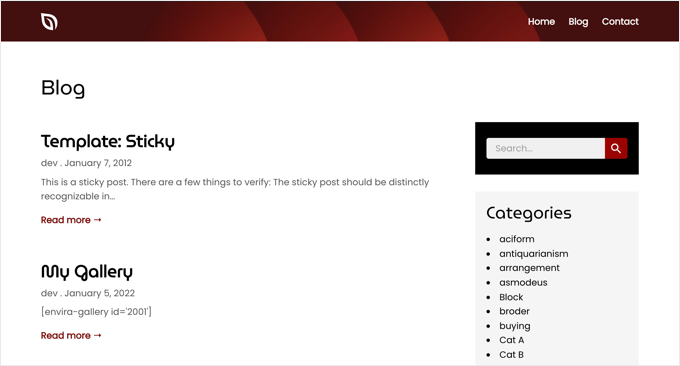
Bonus: Display Your Recent Posts in WordPress
Once you have created a separate blog page, you can still show some recent posts on your home page to encourage users to explore more of your site.
To do this, open your homepage in the WordPress block editor. Once you are there, click the ‘Add Block’ button at the top left corner of the screen to open the block menu.
From here, simply add the ‘Latest Posts’ block to the page. Once you do that, you can customize the list of recent posts to display post excerpts, author names, and dates according to your liking.
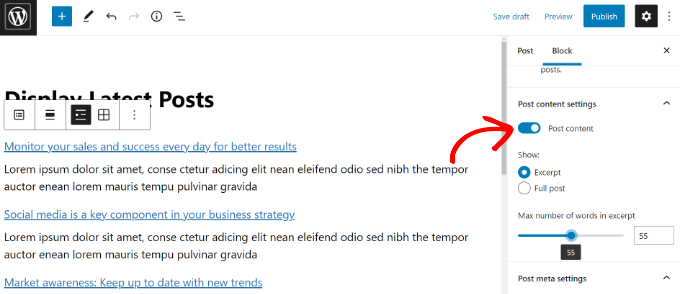
Finally, click the ‘Publish’ button at the top to store your settings. Now, some of your recent posts will still be displayed on the home page to ensure that users spend more time on your website.
For more information, you can see our tutorial on how to display recent posts in WordPress.
We hope this tutorial helped you learn how to create a separate page for blog posts in WordPress. You may also want to learn how to add custom post status for blog posts in WordPress or check out our list of the best related posts plugins for WordPress.
If you liked this article, then please subscribe to our YouTube Channel for WordPress video tutorials. You can also find us on Twitter and Facebook.





Samson
I created a blog using the static homepage setting. But I have an issue. All the details of my blogs are opened in my blog section. My goal is to make it write a little tent about each blog section and skip to the next blog topic so that when clicked on, it would open fully the selected blog
Njofie Wilso
Great video. Really helpful.
I love WPbeginner.
WPbeginner has been a great resource to me.
Chantelle
Thank you so much! Have been struggling like forever to figure this out!!
Patrick
I’m trying to add posts to my blog post page, I went to the reading setting on the dashboard to enable the page I want as my blog page. Then I made a post and posted it to that blog page. It showed up on the right page, however it appears underneath the top header of the page, so the header is overlapping the post. Help!
Sarah
Thank you this was so easy! I’ve been trying to figure this out for ages now and I stumbled across your video.
Wanda
Hello:
Thank you so much. This was very helpful. I’m wondering if there is an easy way to create a header for the Blog page as my picture gets lost when you create a static home page. From what I gather, it can only be coded in HTML so I’m hoping there is more current good news on this.
WPBeginner Support
Hi Wanda,
You can try this, edit the blog page and set the image you want to use in the header as featured image. Most themes use the featured image as header in their page templates.
Admin
Tina Venema
what can i do so my home page feature image does not override the feature image I have chosen for my blog post page called ‘stories’. I have made my homepage static. thanks.
WPBeginner Support
Hi Tina,
It depends on your theme. Normally, if you set a featured image for your homepage then it should only appear on the homepage. However, some users confuse the featured image with the site-wide header image. Please contact your theme’s author for support, they would be able to help you out.
Alison
My posts are showing up as a thumbnail image. I just want it to look like a regular blog. What am I doing wrong?
Paige
This was perfect. Informative and easy to follow. Thanks so much!
Randy
Hi…I have followed the instructions but STILL don’t see my posts on my blog…also, my text in my welcome and about pages is at the bottom of the page…any ideas how to fix both of these…thx so much for your help…
Ellen Thornthwaite
Why doesn’t my WordPress look like this in the video? I have no ‘Reading’ under ‘Settings’. I have created a page called News and I have written a separate blog post but I cannot understand how to link the two.
Binay
Exactly! I am facing a similar problem.
Wood Hughes
Is it possible to have multiple posts pages in WordPress?
My concept is one page for gardening posts, one for real estate advice, and one for commerical land training information.
WPBeginner Support
Hello,
Please see our guide on how to add topics in WordPress navigation.
Admin
Mathukutty P. V.
Just found this tweet and tried. Never knew about creating a page for blog posts. Thanks a lot.
Mary
The information of easy to follow and helped me do what I’ve been trying to accomplish for awhile. Thx
Max Shea
Complicate the simple. Make the simple complicated. That’s Wordpress.
tricia norris
Your explanation makes sense, but where does the existing home page go? I am creating a new home page, but does that mean I need to build a new home page?
Micki Allen
Thank YOU!
Anirban Karmakar
Is there any SEO benefits to Create a Separate Page for Blog Posts in WordPress? Or any SEO losses when I change my default Blog Post location to a custom page?
Sally
Hello! This is great…but! Can you help me add a SECOND blog page to my website?
WPBeginner Support
Hi Sally,
If you want to add numbers below blog page, then please see our guide on how to add numeric pagination in WordPress.
Admin
Danielle
How to add a blog page to page builder for mobile menu in wordpress? It seems like The blog page isn’t visible there.
Joan
this article was great. I think I need to start over! cause when I click on blog, the blog I wrote is over all the pictures from the front page and from the one I attached to a particular blog. This is way too hard.
Olivia
Hey, could you please help me? I really want to be able to sort my posts into different pages on my blog to keep things organized. Is this possible? If not, is there any alternative that could help me to post images with captions sort of like “posts” instead of just making the page look like that permanently? I want to be able to view a sort of gallery of images, and when I click on them get the full-screen version with captions. I found a perfect theme to let me do this, but I can’t get these to go anywhere but the front page! I really want to copy these posts onto my different pages.
Kim
THANK YOU. This was driving me nuts and your explanation couldn’t have been easier for this non techie website builder
Mort Wakeland
The info and video seem a bit dated for my WordPress does not have some of the options discussed. The video is pretty good except in places she skips steps. We are beginners, not experts, and we need all the “bread crumbs” we can get.
I followed the directions as best as I could, knowing this latest version of Word Press does not have a lot of the steps mentioned, e.g., there are no “discussions” to uncheck.
When I access my website, there was a static page with only Home listed. Where is Blog?
Reading additional sites, it appears the theme one installs has something to do with what shows and does show on the home screen – correct? To me this is a convoluted mess with no straightforward instructions. Most frustrating. If the theme is important, as some websites suggest, then why is it not one of the first things mention?
For me – I’ve already generated a blog and it works. I need to also generate a webpage for the communications class I’m in. So, with a blog already present, how does one add a static home page, wherein one can access the blog that has already been made in WordPress. Seems straightforward – but it’s not for I cannot find a fix to this question. Any advice, suggestions on sites to read, would be appreciated. This is like making a “mountain out of a molehill.”
Best evening wishes,
Dave
I followed written directions using WordPress 4.9.1 and found the discussions checkbox; try ignoring the video.
To have the Blog page be selectable as the Posts page, you have to create the Blog page first.
Themes may mangle a lot of WordPress instructions, there’s no way an instructional blog can know that, and it might be discouraging to state that at the beginning; this kind of thing is generally normal in many things you can customize.
You can add a static home page in Setttings > Reading as stated in the instructions.
Ern Miller
I created a page called “Blog” and linked to it, but I cannot figure out how to add blog posts to it, except to edit the “Blog” page as a static document. I cannot figure out how to link to blog entries.
IShita
My admin side bar doesn’t show me the reading tab everyone is referring to. I am using Wordpress.com and want to post different blog posts to different pages. Just blog posts. Nothing else. Help Please. I have zero background in CSS or anything as such.
Thanks.
WPBeginner Support
Hi IShita,
This article is about self hosted WordPress.org websites. Please see our guide on the difference between self hosted WordPress.org vs free WordPress.com blog.
Admin
Sam Jane Price
Thanks so much for this info. Quick & easy fix
Danielle
I set up my site similar to the video except that I have my posts as News, and they are pushed to the News page. However, once a user navigates away from the homepage to the News page, the menu breaks and they cannot get back home, unless by clicking the back button. I know this has something to do with my file hierarchy (as I installed wordpress to my server manually) but I can’t identify where to fix this. Anyone have an idea what I’m doing wrong? Much appreciated!
Vidya Venugopal
Problem solved, Thanks!
Anjali Kulkarni
Still it not clear to me I have my own site at and it has some pages too but I want more pages for different section just like this site has “start here” deal and so on if create pages then how to add that blog to specific page, please explain in details….
gabriel
This solved my problems, thanks
Soren Pejstrup
Thanks for all you great content. I’m shifting fra Joomla to Wordpress, and I’m enjoying it – and you’re helping me on the way. Thanks so much.
I’ve build out a couple og blog pages on different sites new.
In Joomla I was used to sort pages with post by popularity so that the most visited (not the newest) where on top.
Do you know how this can be done in Wordpress?
Thx Soren
Sara
This was just what I was looking for. I usually use Wordpress templates that already have the blog page specified, but now I won’t need to do that. Thanks to your instructions, I can easily do it myself!
Laura
I have all of this set up, but now my header image will not show up on my posts page. It shows up on the backend (I use visual composer). But when I preview my blog page, it takes me to the homepage and when I actually go to my live blog page, the posts are there but not the header image.
Does it have something to do with my theme?
Thank you!
Odinn Burkni
I have the exact same problem. There’s no header image on the blog page even though I have it set up on the page in wp-admin.
Jenn
Thank you! This video was great, exactly what I was looking for!
Musa Hussen
I have static page for home page and blog page for all of default post..Now I want to display some post on my home page. How could I do it. Thanks
WPBeginner Support
Hi Musa,
There are multiple ways to do that. You can use the Display Posts Shortcode plugin. You can also use the Recent Posts Extended Widget plugin.
Admin
peter
hi WP beginners, how can i post multiple posts in a page. i have like sports, tech… but i can only post in the home page. please reply, thanks.
Sian
I don’t most of those settings as my WordPress looks nothing like that. Why is that, what can I do?
WPBeginner Support
Hi Sian,
You are probably using WordPress.com. Please see our guide on the difference between self hosted WordPress.org vs free WordPress.com blog.
Admin
leanne ferguson
I have created separate pages for different subject areas and now want to add multiple posts to each subject area that will have different themes I.e. one of my pages is called museum trips and exhibition’s and on that page I want to add separate blogs or posts about different museums I have visited which will include photographs. how do I do this please?
Rich
Did you ever get an answer?? i am trying to do the same thing…google picks up your comment and brings me to this post.
Steven Denger
Hello Leanne – I have just recently started to use “posts” instead of pages, except for 1 or 2 exceptions. You go into the Posts > Categories and create a parent category: Museum Trips. Then you can create another category and title it “Museums Visitied” (or somenthing of that nature) and make it a parent (by not checking any parent categories).Then when you make a post about Museum trips, check that category box “Museum Trips” in your post editor on the right near the page attributes. As well, when you make “Museums Visited” posts, you can check that box to indicate which category it goes under, which would be Museums Visited. Now go to your “Menus” and create menu items under the “category” panel just under the normal place of menus. You just check the boxes and then click”Add Menu Items” and then they will be linked just as any other menu link on your nav bar. When the menu links are clicked, you will see just the posts features under that particular category. It is a great way to “segment” your contents and organize them.
As you create posts about one subject or the other, just make sure you check which category it goes in and it will show up there in it’s separate feature page, just like you want.
You may have already figured this out, but I just now saw your post so I thought I would answer. Good Luck.
kelsey
HELP!!!!!!!! THIS BROKE MY HOME PAGE!!!!!!!! I’ve now lost my actual home page where is it??? How do I undo this????????
WPBeginner Support
Hey Kesley,
Start the tutorial again and undo the steps you took earlier.
Admin
akhlaq
hello, nice tips.
i would to ask you how to make my url is like this
mydomain.com/tutorial-web/post.html and not mydomain.com/category/tutorial-web/post.html
and if my visitor go to mydomain.com/tutorial-web/ the will find all post with ‘Tutorial Web’ category at that page
sorry for my bad english
Thanks for your tutorial, your website is amazing for beginner like me
Lauren
Hi
This is a very useful post – except when I go on settings there literally isn’t a reading settings section. Can you help me?? I might just be being stupid but I need assistance asap
Thank you
Tirso
Hi, thanks for your information, but I have a problem with the menu on my posts page in my wordpress.
Here is the thing… I created a new page for posts as you said and I set a menu I created for posts and pages (as secondary menu) and everything is fine with the menu until I switch that page to “Posts page” on “Settings > Reading”… When I do that, it changes the menu to my “primary menu” automatically and I don’t know what to do so that it takes the secondary menu…
Hope you can help me!
Donald
I’d actually already done what you said in this video, but isn’t working as I was expecting. It does put the blog to ./blog as expected, however you can still see the blog (and about and contact etc…) on the home page if you scroll down, and I was expecting to ONLY have the Home page visible. i.e. scroll down and only see the bottom of the home page. This is with the Twelve Seventeen theme (not sure if it’s related to that?). Is there a way to make ONLY the Home page display? (from the wording of the settings you’d think that’s what you’re doing, but that’s not what I see when done – see all the same stuff as before, but now the blog has a place of it’s own in addition)
Brittinni
How would you differentiate a home page verses an about page? I’ve read that both have a good bit of overlap.
Krishna Roy
hello WP beginners,
First of all I want to thanks for all wp tutorials. By watching your tutorials i have created a website + Blog . Its working fine. But i want to ask one thing. I have installed “bbpress” plugin for create forum in my website and when new users want to register in my blog then ” bbpress” not sending their passwords to their emails.
Can yo help me for that? how can i configure bbpress properly for new users registration.
WPBeginner Support
Hi Krishna,
Please see our guide on how to fix WordPress not sending email issue.
Admin
Joyce
OMG. Thank you so much. With all the you tube tutorials, there is nothing that I could find that actually detailed this specific required info. I am so glad I found this site. :o)
WPBeginner Support
Hey Joyce,
We are glad that you found this article helpful. You may also want to subscribe to our YouTube Channel for WordPress video tutorials.
Admin
Amanda
Hi,
Thank you, but what about if there is no Template option to choose in Page Attributes? I’m working with Twenty Seventeen and it is not an option.
Mark
Hi,
I have a static front page and a post page.
How do you put a title onto the Blog page?
It’s just it doesn’t flow with the look of the other pages! my site is so you can see what I mean.
Thanks
Mark
Jordan Stocker
This was a life saver – thank you!!
Nancy
Thank you for your help! I was very frustrated until you helped me.
Elakkiya
This page is very helpful to me!!!. Thank you…